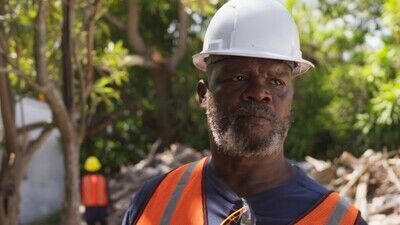Though “Mountains” spends most of its time grappling with the quiet worries of its immigrant characters, Sorelle eventually turns to their son Junior (Chris Renois), an aspiring standup comedian still living at home whose chosen career path doesn’t align with what Xavier envisioned for him. His perspective on his parents’ rigid mindset, and how it clashes with the idea of pursuing one’s “dreams,” enrich this layered appreciation of this household, a proxy for countless others in any diaspora. The perceptive writer-director further balances the scales through a scene where Xavier himself is looked down on by his wealthy brother-in-law for what the latter deems a lack of ambition. That Sorelle’s co-writer Robert Colom is Cuban may contribute to the honesty on display when Xavier’s Cuban boss utters openly racist remarks about him and another Black employee, confirming such attitudes prevail even among groups that have more in common than not.
Soon, corporate vultures, eager to buy homes for cheap, begin to circle the family, banking, likely, on how unwelcoming the new developments will make the area for the immigrant population. What’s more insidious is that they tacitly force those who live there to partake in their own displacement: when Xavier and Esperance attend the open house for the residence they dream of owing, the person assisting the agent whispers to them in Creole—she is also of Haitian descent—not as a reassuring gesture, but with an undertone of condescension that Esperance doesn’t appreciate. Slowly, their acquittances will be replaced with people new to the neighborhood who act is if it has always belonged to them. That’s how gentrification operates, turning spaces that once held significance for the marginalized into bland playgrounds for outsiders who can afford them. It’s a mentality of ruthless appropriation with no interest in fostering community. The strength of Sorelle’s storytelling hinges on how she divulges these points not in verbose dialogue or forced confrontations, but through the ambivalent emotions that coat all human drama.
There, among the ruins of a vibrant community under siege, Xavier stands tall taking claim to the place where he’s built a life, humble and hard-fought but his and his family’s. To leave would mean to migrate again, to be uprooted and stripped from any semblance of home, all for the benefit of neo-colonizers whose economic prowess inflicts pain guised as opportunity. Xavier’s mere presence means resistance, as do the boisterous sounds of his people’s festivities and of their language. And though the bulldozers may rip windows and walls apart, it’s the intangible that’s unmovable. They, indeed, can’t move mountains.

